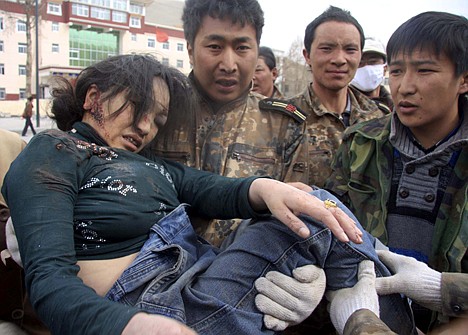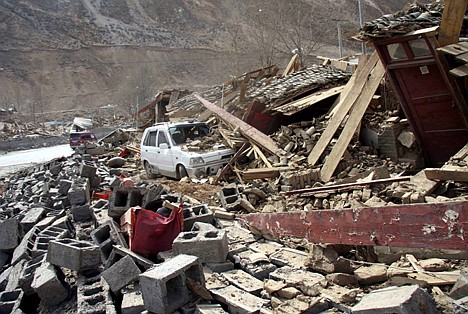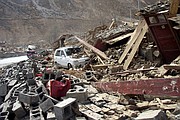Quake in remote west China kills 617
XINING, China - China poured workers and equipment into a mountainous Tibetan region Thursday in a bid to find survivors more than a day after strong earthquakes killed more than 600 people and injured thousands.
The series of quakes flattened buildings across remote western Yushu county and sent survivors, many bleeding from their wounds, flooding into the streets of Jiegu township. State television showed block after devastated block of toppled mud and wood homes. Local officials said 85 percent of the buildings had been destroyed.
Survivors spent the night outdoors, where temperatures fell below freezing and aftershocks continued, residents said. With limited medical supplies and doctors, survivors with broken limbs could do no more than wait for help.
"This feels like a war zone. It's a complete mess. At night, people were crying and shouting. Women were crying for their families," said Ren Yu, general manager of Yushu Hotel in Jiegu, who said he felt at least five aftershocks overnight. "Some of the people have broken legs or arms but all they can get now is an injection. They were crying in pain."
Rescue work focused on several collapsed schools, with the state news agency saying at least 56 students died. Worst hit was the Yushu Vocational School, where the officials Xinhua News Agency cited a local education official as saying 22 students died, 20 of them girls.
The destruction of schools was an eerie echo of the massive magnitude-7.9 quake that hit neighboring Sichuan province two years ago, leaving nearly 90,000 people dead or missing. Thousands of students among the dead were killed when their schools collapsed. Poor design, shoddy construction and the lax enforcement of building codes were found to be rampant.
However, in affected areas of Qinghai most of the buildings fell, unlike in Sichuan where schools collapsed while buildings around them remained standing, giving the impression that schools were built to lower standards.
Ren said hotel staffers returning from assisting in rescue work at night described horrific casualties the quake had caused: "They told me that when some elementary school students were pulled out, their brains had spilled out."
Some people had to sleep on the sides of streets with nothing more than blankets, said Tashi Tsering, director of Jinpa, a charity that supports education and health projects in Yushu.
"It's very ghastly. The whole town has come down," Tashi Tsering said. "Most of the houses are made of wood and mud so they have totally collapsed to the ground. I'm sure there are some alive underneath but I don't think there are many of them." Survivors needed emergency medical supplies, water, sanitation, food and clothing, he added.
State broadcaster CCTV showed footage of rescuers working at night, picking through the rubble aided by flashlights fixed to their safety helmets. A group of workers found a girl trapped for more than 12 hours under a heap of debris.
"I can't feel my arm," said the girl, who was curled up with her back to the workers. The workers talked to her and fed her water as others searched for pieces of wood to prop up the rubble that had entrapped her. As rescuers gingerly pulled her out and carried her to a stretcher, she could be heard saying: "I'm sorry for the trouble. Thank you, I will never forget this."
CCTV said the death toll had risen to 617 by late morning Thursday, with more than 9,000 injured - including 970 seriously - and around 300 still missing. The Ministry of Civil Affairs said about 15,000 houses had collapsed and 100,000 people need to be relocated.
The airport in Xining, the nearest big city 530 miles away, was filled in the predawn hours Thursday with Chinese troops in camouflage, firefighters and rescue teams leading dozens of sniffer dogs. They were whisked onto waiting buses for the difficult drive to the quake zone, which takes 12 hours under the best of conditions.
Yang Xuesong, a rescuer from Shandong province in eastern China, said his biggest concern was the altitude. "This is the highlands. I don't know if the search dogs can get used to it," he said.
Military convoys wound along a two-lane highway leading to the quake zone, nestled amid scrubby hills dotted with Tibetan prayer flags and herds of grazing yak.
While China's military is well-practiced in responding to disasters, the remote location posed logistical difficulties. The area sits at around 13,000 feet and is poor. Most people live in Jiegu, known by Tibetans as Gyegu and about 20 miles from the epicenter, with the remaining - mostly herders - scattered across the broad valleys.
President Hu Jintao and Premier Wen Jiabao urged "all-out efforts" to rescue survivors and dispatched a vice-premier to supervise the effort. The government immediately allocated $30 million for relief.



